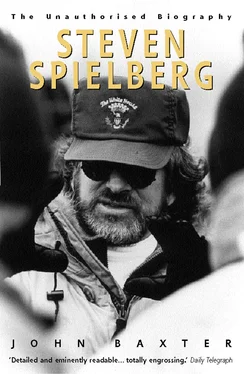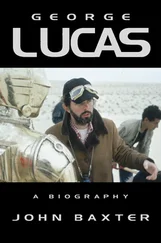Once he started shooting, Spielberg had his hands full controlling his first major feature crew, and in particular Zsigmond, who had ambitions to direct and wasn’t backward in suggesting how he would have planned a scene. These problems were exacerbated when Spielberg insisted on operating the camera himself for many sequences. Lighting cameramen traditionally work with an operator who runs the camera while they concentrate on placing lights and mapping out movements. Spielberg, however, still had the amateur’s love of shooting, and would continue to handle the camera on many scenes throughout his career, to the irritation of directors of photography.
‘Vilmos is a very interesting man,’ Spielberg said diplomatically, ‘And when you employ his great camera eye, you also get gratis his thoughts. He would offer ideas beyond the definition of the American cinematographer.’ Arguments were common, but Spielberg won most of them. ‘When a cameraman [has] free rein,’ he said, ‘he becomes the director and the director becomes the apprentice.’ And he felt he’d gone through his apprenticeship at Universal already. However it was Zsigmond who persuaded him that the camera, rather than occupying the position of a detached directorial Eye of God, should always represent the point of view of a character. Thereafter, Spielberg’s films became more concerned with people and a little less like cartoons.
‘Several crew members said they’d never been on a happier location,’ Goldie Hawn remarked. ‘Four of them ended up marrying local girls from San Antonio, which was our base of operations. One was a waitress, another took reservations at the Holiday Inn. Hollywood meets Texas. It was a happy company.’ Spielberg was unaffected, even amused by the nocturnal sighs and moans, which, characteristically, he noted in relation to a movie. ‘Walking along the hall at one in the morning at those Holiday Inns sometimes sounds like Gyorgy Ligeti’s Atmospheres from 2001 .’ Sex helped alleviate the tensions of working in a district fed up with film units. Sam Peckinpah was shooting The Getaway in the area, and his piratical crew had looted CB radios from their hired police cars. As a result, Zanuck/Brown had to buy twenty-five junked black-and-whites at auction. After the shoot, Spielberg bought the Poplins’ car, with dozens of bullet holes still visible where the special effects technicians had drilled them, and drove it for years.
In February, he had cause to be glad he turned down White Lightning . Scandal erupted on location for Reynolds’s The Man who Loved Cat Dancing , shooting in Gila Bend, Arizona, with his one-time playmate Sarah Miles. Miles’s ‘personal assistant’ David Whiting was found dead after a Quaalude overdose, and evidence at the inquest suggested he and Reynolds had been sharing Miles’s bed. In different circumstances, it might have been Spielberg, not Vanishing Point’s Richard Sarafian, who had to handle this production and public-relations nightmare.
In May 1973, just as shooting on Sugarland ended, literary agent Roberta Pryor delivered to Zanuck in the California office and to Brown in New York typescripts of a new novel by an unknown writer. Both men read it overnight. Richer producers, once they got around to looking at it, were ready to buy the book, but by then Zanuck and Brown, often telephoning from public phones and restaurants to disguise their interest in the property, had snatched Peter Benchley’s Jaws for $175,000, with a further $75,000 for writing the first-draft screenplay, plus 10 per cent of net profits.
A few days later, Spielberg spotted the manuscript on Zanuck’s desk and took it home for the weekend. After reading until late, he tried to sleep, but woke from disturbed dreams. At 3 a.m. he picked up the book again, gripped by the story of a monster ravaging an East Coast resort until killed by a coalition of the local police chief, an Ivy League scientist and an old shark-hunter.
By Sunday night, he knew he had to film Jaws . All his life he’d feared the sea and its creatures. When he bought a house at Malibu in the eighties, he had nightmares of the waves undermining the foundations, and dreamed of piling up sandbags to protect it. He felt personally attacked by the shark, and wanted to strike back. This was reflex thinking, punch/counterpunch, the sort that video games sharpened. On Monday he walked into Zanuck and Brown’s office and said, ‘Let me direct this film.’
‘We’ve got a director,’ Brown told him.
He was Dick Richards, a competent technician but, more importantly, a client of Mike Medavoy, who also represented Benchley and had attached Richards to the project at its inception.
‘Well, if anything falls out,’ Spielberg told Brown, ‘I love this project.’
He didn’t have long to wait. Two days later, Zanuck and Brown lunched with Richards, Benchley and Medavoy. To Benchley’s mounting irritation, Richards kept referring to ‘the whale’. Finally Benchley blew his top; nobody who was unable to tell a shark from a whale was going to film his book. Richards said he’d rather make Raymond Chandler’s Farewell My Lovely anyway, and the fragile coalition collapsed.
Four days after Spielberg expressed interest, Zanuck and Brown offered him the film – and found, to their dismay, that he’d changed his mind.
‘I don’t know,’ he told Zanuck. ‘After all, it’s only a shark story.’ Wouldn’t it be perceived as another Duel : Everyman v. The Beast? At other times he compared it to just an inflated episode of Sea Hunt , the popular 1950s TV scuba series with Lloyd Bridges.
He was also finding the UFO project ‘Watch the Skies’ both more interesting and more challenging.
When pressed, Spielberg always professed scepticism about UFOs. He never mentioned his teenage UFO feature Firelight , nor the phenomenon seen by other members of his Scout troop in the Arizona desert. Later he would claim to have been converted by the US government’s objections to him making ‘Watch the Skies’. ‘I really found my faith,’ he said, ‘when I heard that the government was opposed to the film. If NASA took the time to write me a twenty-page letter, then I knew there must be something happening.’
What he really believed is unimportant. Not for the first time, he was adopting the beliefs of his audience, sensing what polls later made clear: that many Americans, without having particularly strong convictions, felt there ‘might be something to’ flying saucers. For a consensus film-maker, that was enough. Five years before John Naisbitt’s Megatrends became the fashionable read, Spielberg and Close Encounters of the Third Kind , as ‘Watch the Skies’ was renamed, exemplified its propositions: that the best way to beguile America’s slow-reacting public is not to be original but to spot a trend and exploit it; that such trends seldom emerge in Washington or New York but are more apparent in a few heartland states, and in California; and that Americans had lost interest in travelling to outer space. What they now wanted was for outer space to come to them .
It was for the ability to chart the Zeitgeist, to articulate the mood of the crowd before they knew it themselves, and then to exploit it, that Spielberg most admired Orson Welles, whose radio version of War of the Worlds in 1938 convinced thousands that Martians had landed at Grover’s Mill, New Jersey. Welles, he said, ‘was not so much writing a radio program about Martians invading New Jersey as about America’s fear of invasion from Europe. War was just a few months away, but Welles’s invasion was not the Stuka, it was the Martian; it preyed on the vulnerability of the time.’ Spielberg, both in this film and in Jaws , would do the same For the record he repudiated Welles’s broadcast, but later he bought the original script for the programme and displayed it under glass at his home.
Читать дальше












